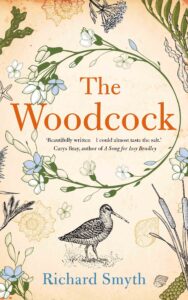Richard Smyth Interview – copy
- 30th June 2021
- Category : Blog
Richard Smyth‘s debut novel, The Woodcock, is published by Fairlight Books on 1 July 2021. This historical novel is set on the fictional coastal town of Gravely in the north east of England. Jon Lowell, a naturalist who writes articles on the flora and fauna of the shoreline, and his wife Harriet lead a simple life, enjoying a fragile peace after the Great War. But when an American whaler arrives in town with his beautiful red-haired daughters, boasting of his plans to build a pier and pleasure-grounds a half-mile out to sea, unexpected tensions and temptations arise. Read this interview with Richard Smyth to find out what inspired this novel.
How did you start writing and what does writing mean to you?

I’ve been writing, one way or another, for as long as I can remember. My granny, Kathleen Heaton, published two novels before I was born; maybe that’s what planted the seed, although it wasn’t really something we talked about much, and I never read her work until I was in my thirties (sorry, Granny). My older brother started writing ‘properly’ before I did – sci-fi and horror stories, mostly, when he was a young teenager. I followed him, and just… kept going.
What does it mean to me? It isn’t so much that I often feel an overpowering urge to do it, as that I never feel quite right if I don’t do it. And when I do do it, of course, I love it. Making stuff up: there’s really nothing like it.
Did you always want to be a writer?
No, I wanted to be a farmer, and then a zookeeper, and then a farm vet, and then a footballer (I’d still like to be a footballer). But I’ve wanted to be a writer since I was about 12. Nothing I’ve done in my life has really prepared me to do anything else.
If you could describe The Woodcock in one word what would it be?
Salty…
The Woodcock is a work of historical fiction – why did you find yourself drawn to writing a story set in the 1920s and what is it about this period that you found so appealing?
I like to write at one remove (or more) from where I am now. You have a freer hand and a clearer perspective – plus, of course, a historical setting can give you additional layers of depth and richness. I keep returning to the 20s because it was just the most fascinating decade: the war before, the Crash after – and I’m really drawn to that particular mixture of the ‘modern’ (in language, lifestyle, attitudes) and the Edwardian/Victorian.
Was there a particular part of the story that you found difficult to write?
People in novels – all novels – are less complicated than real people. They have to be. But in The Woodcock there are one or two characters with whom I tried to push this to the limit. Without giving too much away, there are some complex figures in this book. And that was quite hard work (I mean compared to writing the rest of it – not compared to actual work).
What inspired you to write The Woodcock?
I always regard my own work with absolute bafflement. Where did this come from? All I really know is that I set out to write something set on the coast I love, the North Sea coast of northern England. So Scarborough, Tynemouth, Filey, Whitby, Whitley Bay – these places inspired me. As for the rest, your guess is as good as mine.
What’s the most surprising thing you’ve learned from writing The Woodcock?
I’m terrible at keeping a chronology straight.
What’s your favourite book and who is your favourite author?
I can’t name just one, it’d be unfair on all the others. Pale Fire by Vladmir Nabokov. Dead Souls by Nikolai Gogol. Mrs Dalloway by Virginia Woolf. Earthly Powers by Anthony Burgess. The Sea, The Sea by Iris Murdoch. Postcards by Annie Proulx. Manhattan Transfer by John Dos Passos. Money by Martin Amis. That’s enough to be going on with. Nabokov is probably my favourite.
Do you have a writer’s habit that helps you ‘get in the zone’?
I’m desperately unglamorous in this regard. I just sort of… start writing.
Do you have a writing schedule?
I have a work schedule, which is pretty much nine-to-five and fits around my family schedule (my wife has a proper job, and my kids keep regular hours). Fiction fits into that where it can.
Where do you tend to write?
Always, always, always at my desk, on my PC. God I’m boring.
What do you hope people take away from reading your book?
Ideally, what I’d want them to take away from any good novel: that the world is a complicated, beautiful, terrible place; that life is frightening and complex but worth sticking with, anyway. And that the North Sea coast is the most wonderful place on earth.
What’s a piece of advice you can give to aspiring authors?
Take your work very seriously indeed, and yourself not seriously at all.
Read more about The Woodcock here.
You can find out more about Richard Smyth on his website.














